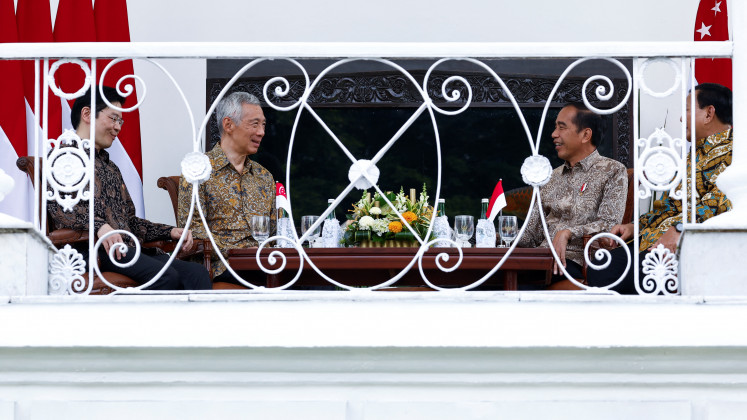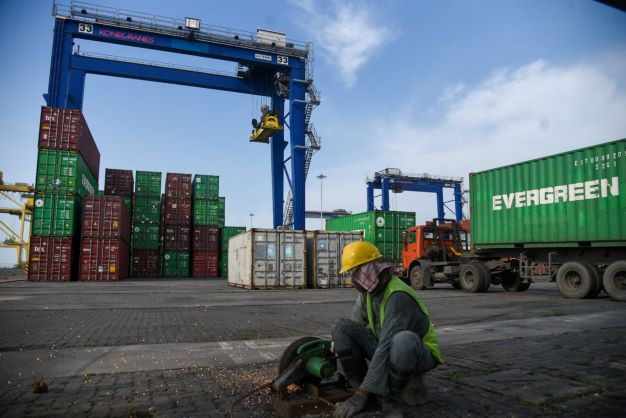Silence leads to continued injustice and impunity
Never forget: A student walks past May 12 Reformation Park in Grogol, West Jakarta, on Wednesday
Change Size

N
ever forget: A student walks past May 12 Reformation Park in Grogol, West Jakarta, on Wednesday. The park was built in memory of four students who were killed in a demonstration demanding reforms in May 1998, when riots also took place targeting those of Chinese descent. (JP/Dhoni Setiawan)
This year, it has been 22 years since the horrific mass violence against hundreds of women, mainly ethnic Chinese, in Jakarta, Medan in North Sumatra and Surakarta in Central Java in May 1998.
I wasn’t about to write anything about the 1998 mass rapes, simply because I felt tired; even if I had to say something, I would be repeating myself over and over again. And it would meet the same reaction: denial after denial by the sitting government. So, what is the point, if whatever we say is just going to be ignored?
However, later I realized the problem is with me. If we feel tired and no longer want to say anything, if we think that our efforts are in vain, if we turn mute, such apathy will allow people in power to do whatever they feel like; it is precisely this kind of reaction that those in power have been waiting for so that they can ignore any human rights violations and concentrate on expanding their power.
How can we remain silent if thousands of houses and shops belonging to ethnic Chinese were looted and/or burnt, hundreds of women and girls as young as 11 years old were repeatedly raped, many with their reproductive
organs destroyed with broken bottles or other blunt objects? One of the victims who had agreed to testify at the United Nations, Ita Martadinata Haryono, was murdered.
On Oct. 9, 1998, four days before she was about to leave for New York, Ita was found dead in her home in Jakarta. Her blood was splattered everywhere on the floors and walls, her body was found naked with her neck broken and slashed. The postmortem results stated she had been also stabbed several times in her abdomen, chest and right arm. No one has been convicted for the mass rapes and the gruesome murder of Ita.
Now, if we choose not to speak up about this injustice, there may be something wrong with us — we have consciously or unconsciously been subdued by the discourse of power to either forget about this or to stay silent.
Despite President Joko “Jokowi” Widodo’s promise to settle past human rights cases, this mass rape has not been addressed and discrimination cases against the ethnic Chinese have continued. Two of the big discrimination cases during the Jokowi’s period involved ethnic Chinese people who spoke against the injustice they experienced. At the end of July 2016, for instance, several temples in Tanjung Balai, North Sumatra, were destroyed and burned.
It started with the protest of a Buddhist ethnic Chinese woman named Meiliana, who complained about the loud noise of a nearby mosque. This exploded as a racial sentiment, and led to riots and burning of 14 Chinese and Buddhist temples. Meiliana was also brought to court and was charged with religious blasphemy. She was sentenced to 18 months in prison.
How about the people who burned and looted the temples? They were also charged, but all of them got much lower sentences than Meiliana. Seven of them were sentenced to 1.5 months in jail, and one of them two months 18 days. Apparently, complaining about loud noise is much worse than burning and looting if you belong to a stigmatized or minority group in Indonesia (in this case, those of ethnic Chinese).
Another “slip of the tongue” from an ethnic Chinese also became fatal, despite his popularity as then-Jakarta governor Basuki “Ahok” Tjahaja Purnama. At an election campaign event at the end of 2016, Ahok criticized religious leaders who were using an interpretation of the Surah Al-Maidah of the Quran, against him. These religious leaders had said that based on the Al-Maidah verse 51, non-Muslims was not supposed to become leaders of Muslims. Large protests against Ahok, full of anti-Chinese slogans, followed. Slogans such as “Crush the Chinese people” spread around Jakarta. Like Meiliana, Ahok was also charged with blasphemy and sentenced to two years’ imprisonment.
The above cases caused by “the slip of tongue” have indeed made many ethnic Chinese more careful and worried — for if they speak up and are considered wrong, they will be in trouble. Many have even said: “It is safer for us to
stay silent and say nothing even if we have been discriminated against.” Some of the ethnic Chinese even blamed Ahok and Meiliana for being careless.
For me, Ahok and Meiliana did not make a slip of the tongue. Meiliana had merely complained privately about the “injustice” she experienced: Loud sounds can really disturb one’s health. There is also a regulation on loud noise, so as not to disturb people. Thus, Meiliana did not actually break the law. It is everyone’s right to demand people to control the noise they produce.
Similarly, Ahok did not criticize the Quran per se, but the religious leaders who used the Quran to vilify him. But this does not matter: their words were considered wrong and they had to go to prison.
This made me remember what my parents often said when I was a child if I witnessed some incident I considered unjust: “You cannot say that, because you are Chinese.” I have been trained by them to keep silent, because silence would make us safer.
It is for this very reason that now I push myself to write again about the mass rapes. Because by keeping quiet I may have been safe temporarily, but in the long run, complacency will only benefit the people in power. Silence will just lead to the comfort and impunity of these people to do whatever they like and the continuing abuse of human rights in Indonesia.
______
Senior lector at the Department of Languages, Culture and Linguistics at the SOAS University of London









